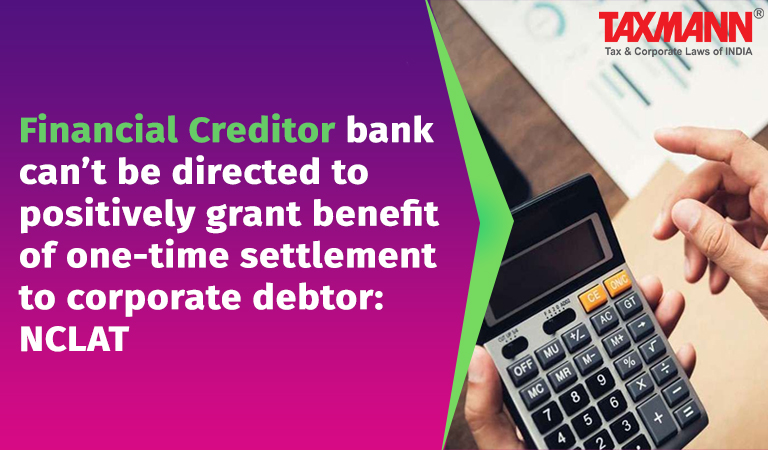Financial Creditor bank can’t be directed to positively grant benefit of one-time settlement to corporate debtor: NCLAT
- Blog|News|Insolvency and Bankruptcy Code|
- 2 Min Read
- By Taxmann
- |
- Last Updated on 18 August, 2022

Case Details: Sanjeev Mahajan v. India Bank (Erstwhile Allahabad Bank) - [2022] 141 taxmann.com 203 (NCLAT-New Delhi)
Judiciary and Counsel Details
-
- Justice Ashok Bhushan, Chairperson & Naresh Salecha, Technical Member
- Abhijeet Sinha, Kumar Anurag Singh, Zain A. Khan & Vinayak Bhandari, Advs. for the Appellant.
- Rajesh Kumar Gautam , Anant Gautam, Nipun Sharma & Vidur Ahluwalia for the Respondent.
Facts of the Case
In the instant case, the corporate debtor and its other three entities were engaged in the hospitality business and against the corporate debtor and its other three entities certain amounts were due to a financial creditor – a bank.
Thereafter, the compromise proposal offered by the corporate debtor for Rs. 260 crores was accepted by the financial creditor and as per the compromise, an amount of Rs. 154 crores was to be paid on 31.03.2019 and the remaining balance of Rs. 102 crores was to be paid within 90 days.
However, the corporate debtor including other entities made the payment of Rs. 154 crores but could not make the balance payment within 3 months as per the time granted. Consequently, an earlier compromise failed and an application under section 7 was filed by the financial creditor against the corporate debtor.
During the pendency of section 7 application, the financial creditor issued a proposal for the sale of NPA’s of the corporate debtor to Asset Reconstruction Companies (ARC). Thereafter, the corporate debtor gave a one-time settlement offer (OTS) of the same amount at which the financial creditor proposed to assign its debt to Asset Reconstruction Company.
However, the said OTS proposal was rejected by the financial creditor. The National Company Law Tribunal (NCLT) by impugned order admitted the section 7 application, holding that there was debt and default on the part of the corporate debtor.
Thereafter, an appeal was made to the National Company Law Appellate Tribunal (NCLAT) against the order passed by the National Company Law Tribunal (NCLT).
It was submitted that due to the obstinate attitude of the financial creditor, the corporate debtor could not be able to settle the matter and revive its business.
NCLAT Held
The NCLAT held that settlement had to be encouraged in IBC, however, no direction can be issued to the financial creditor to positively grant the benefit of OTS to a corporate debtor.
Further, the NCLAT held that since there was an existence of debt and default, the NCLT had rightly admitted the application filed by the financial creditor under section 7 of the IBC. Thus, no error in the order of the Adjudicating Authority admitting section 7 application was found.
List of Cases Reviewed
-
- Order of NCLT [New delhi] in CP [IB] 1913[ND]/2019], dated 24-12-2021 (para 12) affirmed
- ES Krishnamurthy v. Bharath Hi Tech Builders (P.) Ltd. [2021] 133 taxmann.com 159/[2022] 169 SCL 644 (SC) (para 12)
- Bijnor Urban Co-operative Bank Ltd. v. Meenal Agarwal 2021 SCC OnLine SC 1255 (para 12) followed.
List of Cases Referred to
-
- ES Krishnamurthy v. Bharath Hi Tech Builders (P.) Ltd. [2021] 133 taxmann.com 159/[2022] 169 SCL 644 (SC) (para 10)
- Bijnor Urban Co-operative Bank Ltd. v. Meenal Agarwal 2021 SCC OnLine SC 1255 (para 11).
Disclaimer: The content/information published on the website is only for general information of the user and shall not be construed as legal advice. While the Taxmann has exercised reasonable efforts to ensure the veracity of information/content published, Taxmann shall be under no liability in any manner whatsoever for incorrect information, if any.

Taxmann Publications has a dedicated in-house Research & Editorial Team. This team consists of a team of Chartered Accountants, Company Secretaries, and Lawyers. This team works under the guidance and supervision of editor-in-chief Mr Rakesh Bhargava.
The Research and Editorial Team is responsible for developing reliable and accurate content for the readers. The team follows the six-sigma approach to achieve the benchmark of zero error in its publications and research platforms. The team ensures that the following publication guidelines are thoroughly followed while developing the content:
- The statutory material is obtained only from the authorized and reliable sources
- All the latest developments in the judicial and legislative fields are covered
- Prepare the analytical write-ups on current, controversial, and important issues to help the readers to understand the concept and its implications
- Every content published by Taxmann is complete, accurate and lucid
- All evidence-based statements are supported with proper reference to Section, Circular No., Notification No. or citations
- The golden rules of grammar, style and consistency are thoroughly followed
- Font and size that’s easy to read and remain consistent across all imprint and digital publications are applied



 CA | CS | CMA
CA | CS | CMA
